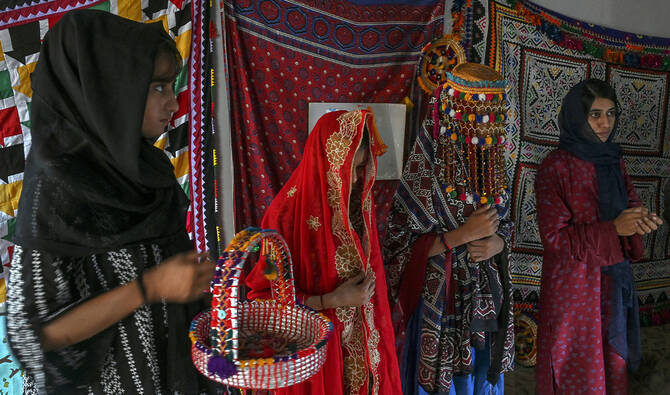ISLAMABAD: Pakistani President Asif Ali Zardari on Friday signed into law a bill criminalizing child marriages in the federal capital of Islamabad, despite opposition from a constitutional body that advises the Pakistani government on the compatibility of laws with Islam.
The law criminalizes underage marriages and introduces strict penalties of up to seven years in prison for family members, clerics and marriage registrars who facilitate or coerce children into early marriages. Any sexual relations within a marriage involving a minor, regardless of consent, will be considered statutory rape, according to the law. An adult man who marries a girl under the legal age could face up to three years in prison.
Pakistan’s National Assembly had unanimously passed the Islamabad Capital Territory Child Marriage Restraint Bill tabled by Pakistan Peoples Party’s (PPP) Sharmila Faruqui on May 16. Under the new law, the minimum legal age for marriage for both men and women in Islamabad is 18. Previously, it was 16 for girls and 18 for boys.
However, the Council of Islamic Ideology this week declared the said bill ‚Äúun-Islamic,‚ÄĚ saying that clauses of the bill, such as fixing the age limit for marriage and declaring marriage below the age of 18 as child abuse and punishable, did not conform with Islamic injunctions.
‚ÄúThe Islamabad Capital Territory Child Marriage Restraint Bill, 2025 is assented to, as passed by the Parliament,‚ÄĚ President Zardari was quoted as saying in a notification issued from his office.
In Pakistan, 29 percent of girls are married by the age of 18 and 4 percent marry before the age of 15, according to Girls Not Brides, a global coalition working to end child marriage. In comparison, five percent of boys marry before 18.
PPP Senator Sherry Rehman thanked the president for signing the bill into law ‚Äúdespite all pressure.‚ÄĚ
‚ÄúProud moment for Pakistan,‚ÄĚ she said on X. ‚ÄúThank you to all the women and men who made this possible after a long journey of twists and turns.‚ÄĚ
Pakistan ranks among the top 10 countries globally with the highest absolute number of women who were married or in a union before turning 18.

In this photograph taken on August 4, 2024 social workers at NGO Sujag Sansar take part in a theatre practice ahead of their performance, intending to create awareness on dangers of child-marriages at the NGO office in Johi, Dadu district of Sindh province. (AFP/File)
Girls who marry young are less likely to complete their education and are more vulnerable to domestic violence, abuse and serious health complications.
Pregnancy poses significantly higher risks for child brides, increasing the chances of obstetric fistulas, sexually transmitted infections and even maternal death. Teenagers are far more likely to die from childbirth-related complications than women in their twenties.












